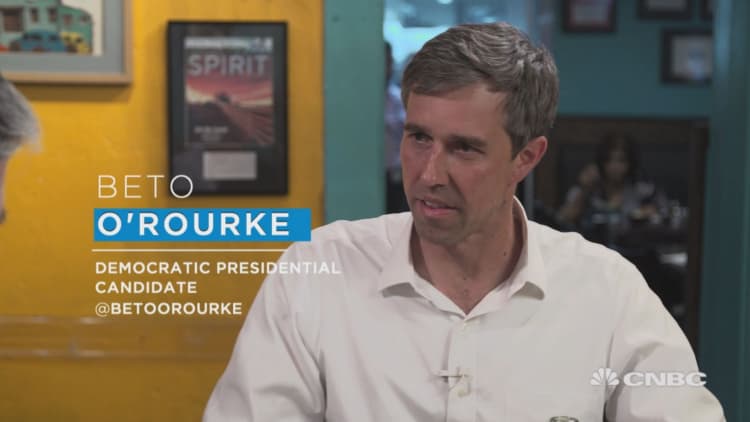
Former Texas Rep. Beto O'Rourke's viability has become a giant question mark in the 2020 presidential race. In 2018, his impassioned Senate campaign against Republican incumbent Ted Cruz made him a national Democratic celebrity and a fund-raising sensation. He narrowly lost, but months later launched a White House bid that, for his backers, evoked memories of Barack Obama a dozen years earlier.
So far, however, O'Rourke has lost momentum rather than gained it. He remains mired in single-digits among Democratic primary voters nationally and in the crucial early states of the nomination contest. The breakout moment of his first debate came at his expense, when fellow Texan Julian Castro chided him for not doing "your homework" on an immigration issue.
Yet the one-time punk musician and small business owner, 46, still displays the charisma and youthful energy in town hall gatherings with voters that have become his signature. He has built substantial campaign teams in early states such as Iowa and South Carolina in search of a summer kick-start.
O'Rourke sat down with Editor at Large John Harwood at El Paso's L&J Café to discuss his campaign and his views on the economy. What follows is a condensed, edited transcript of their discussion.
John Harwood: A couple weeks ago I was with you in Iowa. A woman introduced you there and meant it to be a compliment. She said, "Beto O'Rourke is a blank slate that we can project our hopes and dreams onto." Is that lack of definition a problem for your campaign?
Beto O'Rourke: I hope what she meant by that was, Beto O'Rourke has shown up to our community to listen to us. And he came not just to tell us everything that he's going to do for this country, but to bring every single one of us into the solutions. And not just to his solutions — to our solutions.
So, you know, in some of these smaller, more rural communities in Iowa, I'm listening to farmers who understand rural policy and agricultural policy better than I ever could comin' from El Paso.
They want me to come in and acknowledge the challenge and then ask them how we meet that challenge together?
John Harwood: But do you think that you have defined, in a clear way for people, why you're running and what your core idea is?
Beto O'Rourke: You just met my daughter, Molly. I was telling you about my kids Ulysses and Henry, her brothers. They're counting on me, and they're counting on us at this moment. Earlier today we were in a shelter in Ciudad Juarez, where this country, through the current administration, has turned back asylum seekers throughout their most desperate and vulnerable moments who are penniless and frightened, who are prey to those who will try to take advantage of them in Juarez. Because we, the wealthiest, the most powerful country, one comprised of immigrants, asylum seekers and refugees, cannot find the political will to do the right thing.
All that is on my conscience and it's the judgment of my kids that I fear. I want to make sure that we sit up to do the right thing. When it comes to separated families and kids who've been locked up, when it comes to a system of health care in this country where tens of millions are unable to get the care they need to be well enough to live to their best, the challenge of climate, which is consuming entire communities and going to get exponentially worse if we don't change course, I want to make sure that we're up to this moment.
Not one party, not half the country — all of us are brought into the solutions. The way that I'm running this campaign, the way that I've always served, the way that we ran in Texas, was to write nobody off, take no one for granted, bring everybody in. That's the only way you could beat [President Donald] Trump, the only way you beat these other challenges that we face.
John Harwood: Let me ask you about definition with respect to the economy. I was on your website, clicked on the issue tab. There wasn't a listing for the economy. And I wonder why that is. You're a small business guy.
Beto O'Rourke: Absolutely. I think about the fact that we've organized ourselves in a capitalist economy, and so capital is central to a person's success. And yet so many perspective entrepreneurs have been locked out of any access to capital. It might be where they were raised, who their folks are, the chances they've had in their life. Might also be the color of their skin and the fact that they've been redlined out of access to that.
John Harwood: But why isn't there an economic tab there?
Beto O'Rourke: We'll get it fixed on the website. It's obviously fundamental to our success as a country. More people having the chance to become small business owners and create jobs and offer their services and their food to the folks in this community and this country.
But also making sure that we acknowledge that there are people who are on the outside looking in to the world's greatest economy with no meaningful way to participate — who might be paid $7.25 an hour, the minimum wage, and so therefore are working a second or even a third job to make ends meet for themselves or for their kids.
You have states like mine in Texas where you have a so-called right to work that denies people the right to organize and to use their leverage and the value that they bring to the workforce to exact better working conditions, better wages, better services. I want to make sure that we change all of that, and we change that for the better, and bring every single person into this economy. Then it really works.
John Harwood: The big divide in the campaign is between people like, say, Elizabeth Warren who say, "We need deep, fundamental structural change in how corporations are run and our tax system. In our regulatory system," and those who say "We can move more slowly and more incrementally." It feels to me as if you are trying to straddle those two things.
Beto O'Rourke: I feel like I'm just trying to do the right thing. I'm listening to people who are trying to make ends meet. Hearing from teachers in a kindergarten classroom that some kids at the age of five are already ten months behind in reading comprehension.
I bet you that those are the kids of parents who are working two or three jobs to make ends meet and don't have the luxury, as Amy and I have had, to read to our kids before the first day of kindergarten or first grade. So all this stuff is connected.
So when we call for expanding public education so that we have pre-K universally for every child in every part of the country, it's addressing that. When we're talking about a $15 an hour minimum wage, it is also addressing that. When we talk about guaranteed high quality universal healthcare, it is addressing that. That child's ability to be well enough to learn during that next day of school.
And all these are things that I've heard from people all over this country. So I don't know where you want to fix me on the political spectrum or relative to the other candidates. I just don't define myself in opposition to them, but instead in terms of what I want to achieve.
John Harwood: At the debate the other night you got a question about the 70% tax rate. And you didn't say that was too high, you didn't say it was about right, or too low. Why not?
Beto O'Rourke: I should have. It's too high. I think in my 60 seconds of trying to get an answer in, and trying to root my answer in the fundamental inequality of this economy and the inability of far too many of our fellow Americans to be included in this economy — which is, you know, central to anything else that we're going to address, including the tax rate — I didn't answer the direct question. So if you're asking' me, no, I don't think we should have a 70% tax rate.
John Harwood: What sounds right to you?
Beto O'Rourke:
I think you at a minimum roll back the worst elements of the Trump tax cuts. So the top marginal tax rate back up to 39%.
If you were to do that, and in addition make some other structural changes to our tax code — the corporate tax rate, which was brought down from 35% to 21%, bring that back up to 28% — great place to start. And as you probably know, you generate hundreds of billions of dollars over the next 10 years. If you were to tax capital at the same rate that you tax ordinary wage income, like the waiters who are working here, you also get to some greater structural correction to a very unequal economy, and you generate the revenue necessary.
John Harwood: You mean capital gains and dividends?
Beto O'Rourke: Absolutely. And I want to make sure that I get this point across. You generate the revenue that you need to pay for the investments in education, in health care, in the affordability of college, but you also reduce the concentration of wealth and power and privilege that really defines this age in America in a way that we haven't seen since the last Gilded Age of more than 100 years ago. Both are necessary to ensure that this democracy, this country will work for everybody. If you increase a wealth tax at the inter-generational transfer of wealth within families.. more so than —
John Harwood: You mean the estate tax and the step-up basis.
Beto O'Rourke: Absolutely. You tax at the real value of that given asset. Not just, you know —
John Harwood: So you'd get rid of the step-up basis?
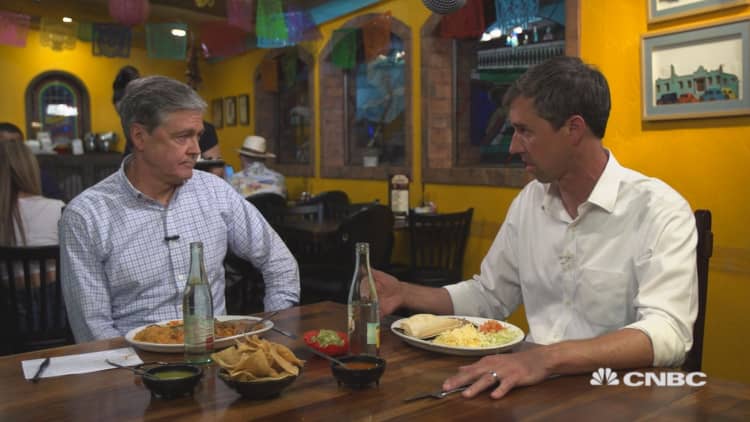
Beto O'Rourke: Absolutely. If you also look at where we're spending money today, and how we've accrued the debt and the current deficit that we're running, it's inescapable that the wars that we have waged, and the fact that we've been in Iraq, for example, for the last 28 years and Afghanistan for 18 years, and in so many other countries around the planet — ending those wars, bringing those service members back home, finding peaceful, non-violent, diplomatic resolution to our foreign policy priorities also produces an extraordinary savings, which could be directed towards investments that we want to make in this country. Infrastructure, education, health care — the things that will make this country stronger and allow more people to participate in the economy.
John Harwood: You proposed a tax the other day to fund veterans' initiatives — to tax families that do not have family members in service. When I talked to economists, they thought that's awfully complicated. What constitutes service? How far does family reach? Is that a fully-baked idea?
Beto O'Rourke: Yeah. Right now we've asked fewer than 1% of our fellow Americans to serve in the wars since 9/11, and the financial cost of that we placed on this country's credit card to be borne by this and future generations. What I'm proposing is that the next time we decide to go to war, we fully pay for all the costs of that war, including making sure that we've made investments in the care for veterans who will have borne the battle.
Those Americans who served in Vietnam waited 40 years for this country to treat exposure to Agent Orange as a presumptive condition for the cancers that they were dying from. Meaning for four decades the VA provided no meaningful help to hundreds of thousands of our fellow Americans. It's been 28 years since Gulf War veterans were exposed to toxins that led to a Gulf War illness. I want to make sure that we're investing right up front when we go to those wars, and the money is deposited in a veterans' trust fund.
John Harwood: But have you and the economic advisors you're relying on thought through how you define what families are exempt? Does your dad count, or is it just your kid?
Beto O'Rourke: If you are a veteran, if you're an active duty service member, you're not going to pay into this veterans' trust fund, because you've already paid with your life. If you're an immediate family member in that household — because we know that when someone from a household serves this country and goes to war, everybody in that household serves this country and goes to war. So your spouse is not subject to this tax.
It ensures that those who have already paid the price are recognized for their service. Those who are currently paying it by being deployed have an investment made to ensure that we're there to meet them when they come back. We're going to spare no expense, bear any burden.
But that the other Americans who have been able to not have to bear the costs of these wars have to contribute something as well.
Beyond generating the revenues we need to pay for the services that those veterans have earned, here's what else it does: I hope it causes us to pause before we go into the next war because we look at the full accounting and cost for what it really takes to pay for not just the bombs and bullets and the deployments, but those veterans who return over the course of their lives. The PTSD, TBI, military sexual trauma that they incur in service to this country — making sure that we're there for them when they come back.
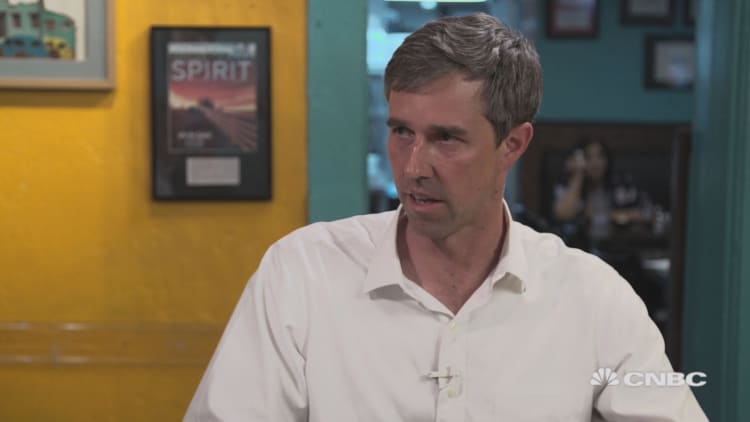
John Harwood: As a member of Generation X, do you subscribe to the argument that baby boomers as a generation have made selfish policy choices that cut their own taxes, that ran up debt, that emphasized consumption rather than resolving a lot of problems?
Beto O'Rourke: No. I mean if we get to pointing fingers at different generations, or blaming our fellow Americans based on a difference in age or geography or really anything else, we just further divide an already polarized country.
John Harwood: But when you think about the tremendous liability the government has when this very large baby-boom generation retires, and the fact that there are fewer workers to pay the taxes to support those benefits as they retire, do you see an issue of generational justice in that? Or injustice?
Beto O'Rourke: I see an opportunity for us to figure out the answers to some pretty significant challenges posed by this generation retiring. You know, within 15 years it's very possible on this current trajectory that Social Security no longer pays 100% of its obligation to our fellow Americans who've worked every single day of their lives and paid into the Social Security trust fund.
John Harwood: So you'd raise the (Social Security tax) cap?
Beto O'Rourke: Yeah.You can blame the previous generation, or you can do the sensible thing and raise the cap.
John Harwood: Do you eliminate it altogether?
Beto O'Rourke: Eliminate it altogether, and make sure that that fund is solvent not just to the next generation, but into the next century. And then look, we spend a lot of time listening to those who are concerned about, or energized over immigration. And we think about very often the threats or the challenges that it poses. Immigrants are coming to this country, traveling thousands of miles for the honor of picking and preparing our food so that we can feed ourselves. Doing jobs that your kids and my kids are, more likely than not, not going to do in this country. And they're an extraordinary opportunity for us to meet our responsibility to successive generations in terms of paying in to this social safety net and make sure that it works.
John Harwood: Trump has proposed cutting levels of legal immigration in half. You've proposed raising visa caps. How much higher do you think legal immigration should go?
Beto O'Rourke: We have millions of unfilled jobs in this country for which we cannot find labor that was born in this country. Now, in some instances that's a mismatch of skills and training and education, so I also call for ensuring that we invest in community colleges, investing in the ability for unions and apprenticeships to meet that gap. But many of those jobs will only be filled by those who are willing to come to this country and to work those jobs.
John Harwood: A million people a year come in legally now. Should we double that?
Beto O'Rourke: I think we should significantly increase it. I think that should be a conversation with small owners, like those here at the L&J Cafe. Farmers, ranchers, producers — all over this country. Immigrant families and communities. Small town America, whose very vitality depends on the willingness of immigrants to come to this country. Making this a much more vibrant, stronger, more successful country than we would otherwise be.
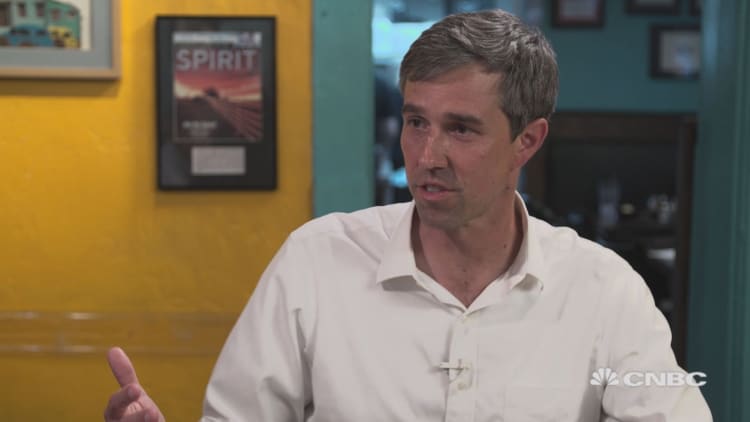
John Harwood: Let me ask you about your experience as a small businessman — both the web services company and the Alt-Weekly. Do you look upon that as a success? And what do you take from it as you think about the economic challenges of the country?
Beto O'Rourke: I do look at it as a success. To be able with good friends — far more talented, smarter than I was — to come together and create opportunity and jobs in the third poorest urban county in the United States, high-value, high-skill, high-tech jobs, that felt really good.
It was really hard to do.
I had some advantages that other Americans don't, and I'll give you an example. I could not get a loan in 1998 to start a technology company in El Paso – just didn't have the assets that the bank would lend against. But my dad, who had a home that was fully paid for, could take out a loan on his home and then lend that money back to me, $20,000. That was the seed capital that allowed us to start a business that ultimately hired dozens of our fellow El Pasoans and served clients all over this country.
John Harwood: Which reflects the wealth disparities that make it so difficult for some too.
Beto O'Rourke: Absolutely. The fact that there's ten times the wealth in white America than there is in black America, that many black Americans literally were drawn out of the ability to get a home loan and buy a home and build equity against which they could borrow to ensure that next generation, their son or daughter, could start a small business.
The more I listen to people and travel the country, the more exceptional my experience seems to have been. And the more it helps to explain the lack of dynamism that we see among small businesses right now. As you consolidate more power in corporations, more market share among fewer companies — when you have fewer opportunities to be able to borrow or to lend out at a community level — you're really — stifling opportunity for so many. So I would love more of my fellow Americans to have the same opportunity I had to be an entrepreneur, to create jobs and opportunity.
John Harwood: Were you good at it? I know that the weekly went out of business, but was the web services company profitable?
Beto O'Rourke: Yeah. It it's still in business today. I don't know how many businesses make it past the 20-year mark, but Stanton Street is still going.
John Harwood: You didn't get rich off of it?
Beto O'Rourke: I didn't get rich off of it, no. And that was never my goal, and it wasn't what drove me. In fact, the most exciting part of the business was the news part. We started an online newspaper covering city hall, arts and culture and the U.S.-Mexico relationship. I moved back here in '98 and I found this to be the most fascinating, exciting place on the planet, and I wanted to tell our story.
I made the brilliant decision — in quotes — to move from an online-only version in the late '90s to print just as the economy and industry was going in the exact opposite direction. But really proud of the writing, and the reporting, and our coverage of City Hall and politics and policy in El Paso. I really think we helped to deepen and improve the conversation and lead to some better policy outcomes in the communities.
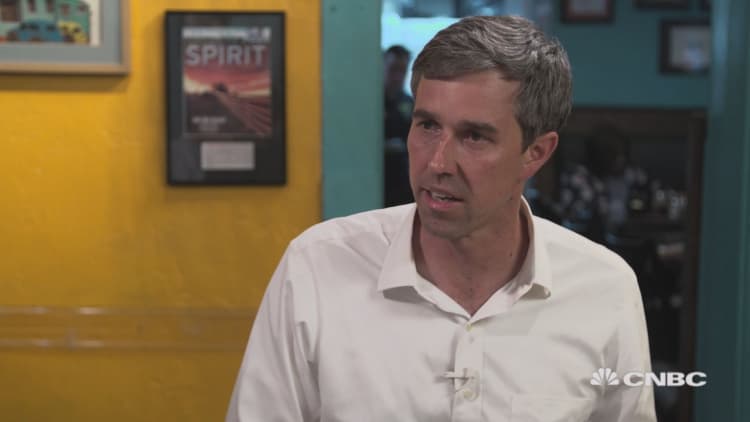
John Harwood: One of the issues that's gotten bigger and bigger in our politics are the pros and cons of gentrification. You dealt with that in El Paso on a development project that had some resistance, and you got some blowback for that. What did you learn that you can apply going forward about how government ought to balance the interests of what may look to most people as economic progress, but has concentrated costs on a small number of people?
Beto O'Rourke: I was on the city council at a time that our downtown had for all intents and purposes died. The core of our community, the center of our city was not alive. And it was hard to retain and attract talent, to create economic growth and development, and make this a city that young people wanted to be in.
There was a really ambitious plan to correct that. But what I learned when we introduced that plan, and then I knocked on the doors of those people who lived within the area of the plan, was it did not meet all of their needs, including protecting them against being priced out of their apartments and their homes. So, based on their feedback, I helped to change the plan to ensure that affordability was a fundamental component of the downtown plan. Affordability for housing was defined as a function of income—that no more than 30% of what you earn would be paid in rent or mortgage or living expenses. And what I think that helped to do, in large part, was to retain the ability for people, whether they lived in south El Paso or the communities that ring downtown El Paso, to stay there.
John Harwood: But even if you make concessions like that, you can't make everybody happy. Is that OK? You've got to, at some point, say, "No, the entire city needs this. We're going to go forward."
Beto O'Rourke: I think you have to do everything within your power to ensure that those who will be most affected by a given policy decision are protected, and benefit from that decision, especially those in communities that very often are overlooked or neglected or are forgotten altogether.
John Harwood: Is what gets referred to as gentrification a bad thing?
Beto O'Rourke: Yeah, it is. When folks who for generations have defined the character and the success of a neighborhood or a community are pushed out because they can no longer afford to be in that community, that's a bad thing. And it's a bad thing that's happening in communities all over the United States right now.
John Harwood: The same principle applies to the issue of trade. Trade expansion is broadly good for the economy. It has diffuse benefits for most people, but concentrated costs for some people in industries adversely affected. You were for trade promotion authority, but now you say you would have been against Trans-Pacific Partnership. Are you trying to have it both ways?
Beto O'Rourke: This community got hit harder than almost any other community in the United States after the passage of the North American Free Trade Agreement. I think there were officially 29,000 trade-adjusted job losses that literally picked up stakes and moved right across the river to Ciudad Juarez.
However, in the intervening years and decades, we have become a trade hub. So now one out of every four jobs in El Paso is connected to U.S.-Mexico trade. It literally drives the economy of the community that are represented in Texas. So, I'm going to fiercely protect those jobs that we have in place. But I'm also going to remember the lessons learned from NAFTA. I wanted to make sure that President Obama had the authority necessary to negotiate the best possible deal for the United States.
All of the goals and all of the motives were noble. But here in Mexico--an economy with which we are joined literally at the hip — to deny the ability to organize, which would improve labor conditions, working standards and incomes in Juarez, and, consequently, would put the American worker on a more level playing field — was a serious sin of omission in that plan.
What I would do in my administration? I'd make sure that we were able to conduct trade negotiations with all of these Pacific partners, but that we prioritize those labor standards, environmental standards and human rights standards so that free trade becomes fair trade.
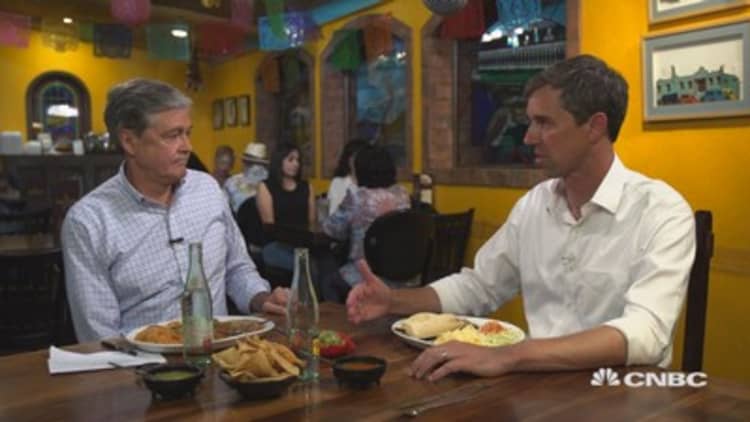
John Harwood: In opposing TPP you're aligned with Donald Trump. Is anything good for the U.S. economy going to come from his confrontation with China?
Beto O'Rourke: No. Listening to people who've been affected by his trade policy and this war that he's entered the United States in with China over trade, that cost is being borne by the American consumer. It's just an additional tax that all of us are paying on the goods that we purchase.
But the real devastation is felt in states like Iowa, where farmers, who for their entire lives or for generations worked to open up markets in China for the soybeans and for the corn that they grow, have seen those markets close to them. And know that even if they reopen, those buyers in those places will find other sellers in other countries. We may never be able to get back in to those places.
John Harwood: Does it frustrate you as a Democrat that many of those farmers are still going to vote for President Trump?
Beto O'Rourke: No. It doesn't frustrate me, and I don't blame anybody. I just know that the onus is on me as a candidate to show up to listen to them, and then to make sure that we all make the connection between what those farmers are experiencing and what this president is doing. Taking us into a war without allies, turning his back on Canada and Mexico.
John Harwood: But TPP was the allies.
Beto O'Rourke: The allies are also the European Union.
If we met China in a united front — the concessions that we want to get to ensure that they don't dump low cost on the United States market, that they don't manipulate their currency, they don't violate the rules of the road that we've all agreed to — we would be successful in every single one of them. Right now, we are in a war with no exit ramp.
That's our negotiating tactic around the world. It's with Kim Jong-un, with the leaders in Iran.
With every single threat or situation we face, we have bucked our allies and friends, and any capacity to meet these challenges successfully. He has diminished our standing in the world and weakened our security and our ability to be successful when it comes to trade.
John Harwood: You mentioned that you had the backstop of a family with privileges and with money. There's a line of critique that you've had kind of a cushy life. Politico had a story saying, "He's been failing upward." Is that a fair point?
Beto O'Rourke: I'll leave that to the voters to decide. But I'll just tell you, over the course of my life I've done everything within my power to bring people in. And to use the opportunity that I have to make sure that more people have an opportunity at economic success. As a city council member, that more people can participate in the policy making at the municipal level, holding town hall meetings every week. As a member of Congress, making sure that every voice is heard and that we get the job done, even in the minority with a Republican majority, every day of the six years that I served. And in Texas, going across every one of those 254 counties, and writing nobody off, and counting nobody out, and taking nobody for granted. And instead, bringing everybody in.
John Harwood: Is there any experience that you've had that makes you think, "I've been through the fire, and that's what made me who I am?"
Beto O'Rourke: For each of us, our entire life is what's made us who we are. I'm trying to give you some of those things that I've worked on, in addition to being a father of three kids who mean the world to me, and for whom I'm running this race right now. And just my record of delivering for people who are counting on this government to work for them.
You can ask any veteran in El Paso about a community that ranked dead last in wait times for a mental health care provider. I didn't blame Republicans for those services not being there. I didn't wait for somebody else to figure it out. We brought people in in this community to make sure that we addressed those challenges and got care to people who needed it.
So that experience was transformative for me. Listening to those who had suffered in service to this country, and who are depending on us to act at their moment of need and our moment of truth, and we came through for them. And that's what I want to do for the people of this country.


